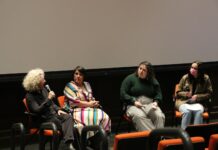Author: Lauren Siverly
Already familiar to Occidental, soprano Karen Benjamin ’83 performed on the Occidental stage once again with her quartet to present Music of the People: Songs of 19th Century America. On the afternoon of Friday, Jan. 28, a small but enthusiastic crowd gathered in the Bird Studio of Booth Music Hall to listen to selections of the concert produced by Benjamin. While this title might not elicit the same reactions as Nas or The Black Keys, the concert attracted folk music fans from around the campus and the greater Eagle Rock neighborhood.
The quartet was made up of bass-baritone Cedric Berry, pianist Victoria Kirsch, soprano Benjamin and stand-up bassist Alan Chapman. The latter two have close Occidental ties: Chapman taught in the Occidental music department for 21 years until 1999, and Benjamin, his wife, is a member of the class of 1983.
As the show opened with lines from Walt Whitman’s “Leaves of Grass,” Chapman explained the concept of their show. The folk music of 19th century America is “a product of the people rather than the individual,” Chapmen said, and their American identity comes from “the language and sensibility of their lyrics [and]…the nature of their melodies, a nature that is inseparable from the rhythms and intonations of our spoken language.”
While different composers created arrangements for the pieces, the songs are a result of the oral traditions of communities. The communities are the authors of the lyrics and melodies. Moreover, according to Chapman, the themes of these songs include “love, loss, justice and faith.” These themes are still relevant to today’s society and are able to connect across generations and borders.
The catalogue of the afternoon varied from well-known battle tunes like “When Johnny Comes Marching Home” to less commonly known pieces such as the song “I Bought Me a Cat”—its animal calls likening it to the nursery rhyme “Old McDonald.”
The music also included spiritual hymns and songs with profound sentiments which spoke out against slavery and Capital Hill corruption. In fact, several selections were taken from the repertoire of The Hutchinson Family, one of the most famous American musical groups of the 19th century.
According to Chapman, the Hutchinson family is “the first protest singers,” as their lyrics decry the injustices of war, politics and discrimination. The family’s music can easily resonate with those frustrated with the political atmosphere of today. One particular song played by the quartet, known as “Eight Dollars a Day,” accuses Congress of delaying bills and supporting war simply to collect more wages.
The songs were augmented by a slide show displaying images from the 19th century that related to their lyrics. Chapman said that they spent weeks searching the Library of Congress Archives for the suitable pictures and drawings. Their search was not in vain. Images such as 19th century political cartoons and portraits of Civil War soldiers provided an interesting backdrop and visual dimension to the show.
The musicians themselves are all classically trained, and it showed through their exceptional performances. Vocalist Berry’s bellowing bass-baritone voice complemented the richness of the traditional spiritual “Deep River.” Chapman’s stand-up bass provided a jazzy feel to the up-tempo music, particularly to the “Shortnin’ Bread” aspect of “The Food Medley.”
Kirsch, while hidden behind the vocalists and the bass visually, was by no means just an accompanist. Her musical aptitude shone through as she was featured in “Swing Lo, Sweet Chariot.” Benjamin showed the audience her extensive range in both theatrics and vocals in her performance of “Single Girl.”
After closing with a Hutchinson family tune, “The World Goes Round and Round,” the group rounded up an encore with the well-known spiritual “Swing Lo, Sweet Chariot.” The arrangement, which included a transposed version of Bach’s Prelude in C Major, was a treat for the audience.
While it sometimes felt that the majority of pieces had rather serious messages, the concert overall had a wonderful sense of its purpose and the arrangements played well to each musician’s strengths. Even if you wouldn’t consider yourself a “folk” fan, this show comes highly recommended for both its historicity and the genuine entertainment it provides.
If you didn’t get a chance to see the show, or would like to see it again, Music of the People will be performing Wednesday, Feb. 23 at 7:30 p.m. in Zipper Hall at the Colburn School. Additional performances will be given across Southern California throughout the rest of year.
More information about upcoming events and the quartet can be found at musicofthepeople.org.
This article has been archived, for more requests please contact us via the support system.
![]()






































